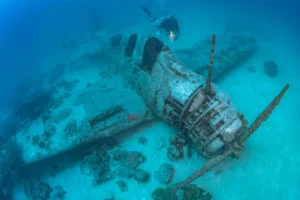PARIS — You regularly hear references to the concept of hybrid warfare, meaning the idea that an act of war can take multiple forms, not just the use of weapons. We may have an example of this in the Baltic Sea, and it is particularly concerning.
Two undersea fiber optic cables ensuring internet communications — one between Sweden and Lithuania, the other between Finland and Germany — were cut within hours of each other, on Sunday and Monday. It takes at least two weeks to repair these cuts in the open sea.
For the latest news & views from every corner of the world, Worldcrunch Today is the only truly international newsletter. Sign up here.
“No one believes that these cables were cut by accident,” German Defense Minister Boris Pistorius said. Although, at this stage, there is no formal evidence of sabotage.
Finland and Germany’s foreign ministers went even further, jointly stating that Europe’s security is not only threatened by Russia’s aggression against Ukraine but also by “hybrid warfare by malicious actors.”
Brewing speculation
Undersea cable accidents are possible: a ship’s anchor dragging a piece of cable, or, as happened in Asia a few years ago, an underwater earthquake causing damage. But two cables cut within hours of each other leave little doubt that these events weren’t related.
Speculation is swift. A Chinese cargo ship, the Yi Peng 3, was spotted in the area and even tracked for a while by a Danish Navy vessel. It had just anchored in a Russian port and was heading toward Egypt. Last year, another Chinese cargo ship had damaged a gas pipeline between Finland and Estonia, though it was unclear whether it was deliberate.
Attributing sabotage is particularly difficult.
Similarly, a connection has been made to the announcement: The day before these incidents, a Russian spy ship, the Yantar, was present in the Irish exclusive economic zone, near the undersea cables connecting Ireland to the United Kingdom. A ship from the Irish fleet escorted it out of the area, while the French, British and U.S. navies monitored its movements.
This forms a body of suspicion, not evidence. And caution remains necessary, especially when remembering the speculation surrounding the sabotage of the Nord Stream 2 pipeline in the Baltic Sea two years ago. Attributing sabotage is particularly difficult.

A specific context
The geopolitical context is, of course, very specific. The Baltic has virtually become a “NATO sea” with Sweden and Finland’s decision to join the Atlantic alliance after Russia’s invasion of Ukraine. Russia is the only Baltic neighbor that is not a member.
Critical infrastructures such as undersea cables have become prime targets in these theorized hybrid wars. These cables, which cross all seas and oceans, have become vital for running modern economies, as well as defense systems.
If it is confirmed that these two cables were sabotaged by a hostile power, it will be another escalation in a fractured world — and surely not the last.






























